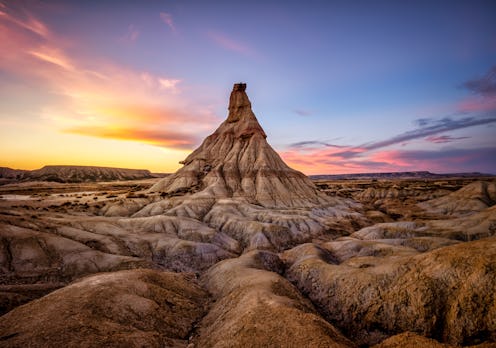Life
How Climate Change Will Affect Human Behavior

As far as practical impacts on human existence go, the effects of climate change are pretty well-documented. We're expecting that global warming will produce higher rates of human mortality, for example, and climate change is also creating a more ideal environment for the spread of parasitic diseases, which is obviously not great for human health. And, thanks to the fact that the climate has changed before, we have insight into the damage it wrought on previous civilizations. But what about the ways climate change will affect human behavior?
I'm not just talking about the choices we'll have to make in response to climate change, like higher rates of migration as water levels rise and various places become unviable for human habitation; I mean the ways in which we react to one another, our environments, and our own mental procedures.
Various species have already been observed to change the way they behave in response to shifts in their environment due to climate change. Some birds, for instance, are changing the way they choose their partners, which is an interesting thought: are humans likely to shift what they find attractive as the globe warms? There's no sign of that just yet; but there are certain ways in which human behavior does seem to be affected by climate change, and they're very interesting. And scary. Don't forget scary.
Warmer Temperatures Will Lead To More Violence & Conflict
One of the major shifts that may happen in human behavior as climate change continues and the planet continues to warm, it seems, is an increase in rates of human conflict. (Yes, I know that sounds like the plot of Mad Max, but stick with me.) The key thing about climate change is that it has actually happened before, in ways that weren't human-caused, and we can track how civilizations in the past responded to those shifts. And the news, according to a landmark study in 2013, isn't good.
The study was huge, taking in everything from archaeological data to historical studies, and stretched from 10,000 BC to the present day. And it found a relationship that should concern us: as the world got hotter, people fought more. "For each 1 standard deviation change in climate toward warmer temperatures or more extreme rainfall," the researchers wrote, "median estimates indicate that the frequency of interpersonal violence rises 4 percent and the frequency of intergroup conflict rises 14 percent." Considering that we're expecting between two-to-four standard deviations in climate change by 2050, this is a very upsetting statistic.
The study found everything from rises in modern assaults to the collapse of ancient empires via exhausting wars tied to shifts in climate towards hotter periods. Some scientists dispute that all the study's conflicts (like civil wars) have anything to do with climate; but it's an interesting perspective. Part of this is likely down to the pressures of increased temperature on resources and the attached problems for civilizations, but part of it also seems to be that we're more aggressive as creatures when we're overheated. Studies have shown that the more uncomfortably hot the temperature, the more likely cities are to experience spikes in personal assaults and aggression. Humans, it seems, respond poorly to heat in general.
Climate Change Will Increase The Incidence & Severity Of Mental Illness
Smithsonian magazine made an excellent point back in 2014, when it laid out ways in which climate change damages human existence. Alongside drought, floods, pressure on food supply and other more traditional problems, the effects on the mentally ill were assessed, and the picture wasn't good. Stress is a problem both for the initial experience of mental health problems and for the exacerbation of symptoms, and natural disasters and climate change-induced problems are a direct way to increase it.
A review of available science in 2015 found several ways in which climate change will link directly to higher incidences of mental health problems, and it's pretty comprehensive. Disasters create highly traumatic human responses, but beyond the immediate trauma of a flood or drought, the impacts can also be more subtle: economic shifts, for instance, can leave people suddenly poor, making them vulnerable to mental health issues, while forced migration in response to environmental difficulties like rising water levels takes severe psychological tolls. And that's not including the mental health price of rising rates of physical health problems, like the infectious diseases I've already mentioned. When it comes to our mental health and ability to care for ourselves, climate change is bad, bad news.
Climate Change Will Shift Our Planning Behavior
This is an interesting one: it seems that our responses to climate shifts include how we forward-plan, affecting our ability to handle crises and our likelihood to resort to violence. It's a theory that was presented by a group of scientists in 2015, who were trying to find the common factor between shifts in weather and human behavioral adjustments. It turns out, according to their research, that the way in which we make planning decisions changes according to the daily weather, which in turn is affected by climate change. And poor planning is linked to social restructuring, violence, and other issues.
"In cities with cold climate the planning behavior of residents increases as the weather gets colder," they wrote, "while in cities with hot climate the planning behavior of residents decreases as the weather gets colder." They measured planning behavior, among other things, via the purchase of coupons in that had specific use-by dates and needed to be redeemed in particular locations. People used to hot weather, it seems, don't react well in planning terms to brief dips into cooler temperatures, which is a particular concern as global warming is linked to increases in freak winter weather events. The 2015 study is only the beginning, but be conscious of the fact that changing climate may genuinely be changing the way you think and plan for the future.